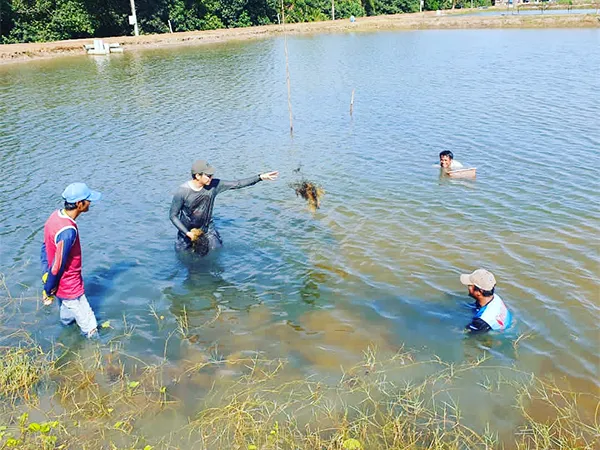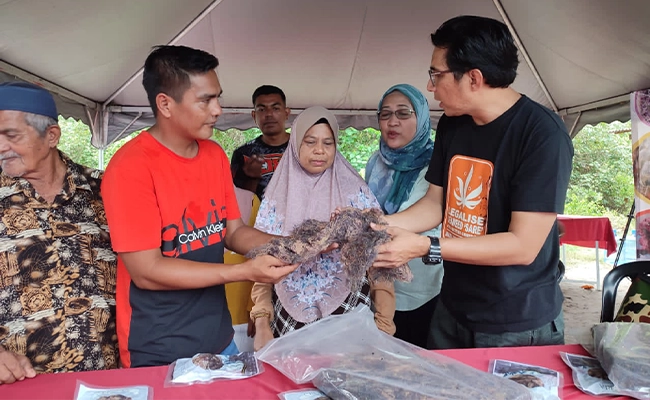
Seaweed Cultivation:
A Nature-Positive Solution to Climate Change
and Food Insecurity
Seaweed cultivation offers a sustainable, nature-positive solution to two of the world’s most pressing challenges: climate change
and food insecurity. As a fast-growing, carbon-absorbing marine plant, seaweed helps mitigate climate change by capturing
CO₂ and improving ocean health. It requires no fresh water or fertilizers, making it an eco-friendly alternative to land-based
agriculture. Rich in nutrients, seaweed also presents a valuable source of food, supporting global efforts to reduce hunger and
malnutrition. With its low environmental impact and high potential for scalability, seaweed farming is a key innovation for a
greener and more resilient future.
Harnessing Sustainable and Nutritious Aquatic Foods Using Cutting-edge Solutions
Enhancing climate resilience in aquaculture through integrated multi-trophic aquaculture (IMTA) and quorum sensing technology for abiotic-resistant beneficial aquatic communities (CRIMTAQ)

Partners & Customers
CWEED AQUA SOLUTIONS SDN BHD’s innovation thrives through our robust partnerships with dedicated affiliates and stakeholders. Their unwavering commitment to our sustainable seaweed-based solutions is essential to our success.

Eco-Sustainable Material Players

Plant Biostimulant Manufacturers

Health Supplements and Beauty Manufacturers

Animal Feed
Manufacturers

Research and Development Entities

Environment and Sustainability Initiatives (ESG)
Our company is specialised in developing specific
or potential applications for seaweed

Acceptance of seaweed as a daily delicacy in Malaysia
Most Malaysians don’t regularly eat seaweed, though certain types like Gracilaria spp. are used during special occasions. Gracilaria spp. is available but requires complex preparation. Offering ready-to-eat, locally grown seaweed with better taste could attract customers. This presents a business opportunity to promote seaweed as a healthy, affordable food. There’s also potential to develop and commercialize seaweed products, ensuring they meet Malaysian safety standards. Awareness efforts include social media campaigns and food exhibitions.

Seaweed as the source of income for coastal community
Most of the seaweed cultivations in Malaysia are conducted in Semporna, Sabah. However, the cultivation is not economical and friendly to the farmer due to the traditional technology used and the usage of old seeds. On the other hand, Gracilaria spp. has been identified as more economical to the farmers. Whereas in Peninsular Malaysia, there is almost no seaweed cultivation activity reported. Our research has strengthened seaweed quality because we have improved seaweed post-harvest activity and eventually the value of seaweed products.

Seaweed as bioremediation (Seaweed Scrubber)
Seaweed is a good nutrient absorber such as ammonia and phosphate. This method is easily set up and cost-effective to commercial water treatment methods. The seaweed will use the nutrients available in polluted water as the source of nutrients for growth and release oxygen for fish consumption. We found that seaweed has the ability to reduce aquaculture waste such as nitrogen and phosphorus.

Seaweed as a carbon sequester
Seaweed can be a good carbon sequester as the seawater’s dissolved carbon dioxide is utilised for photosynthesis. This can be shown by decreasing the concentration of dissolved inorganic carbon and increase in the seawater pH based on our experiments.
Our Commitment to Sustainability

Cweed Aqua Solutions Sdn. Bhd. offers a
sustainable alternative that not only
aims to restore ecosystems but also
ensures the prosperity of coastal
communities.
Get in Touch!
Our passion for seaweed knows no bounds. With in-depth research and exclusive insights, we welcome you to connect with us and explore the remarkable benefits of seaweed.















































